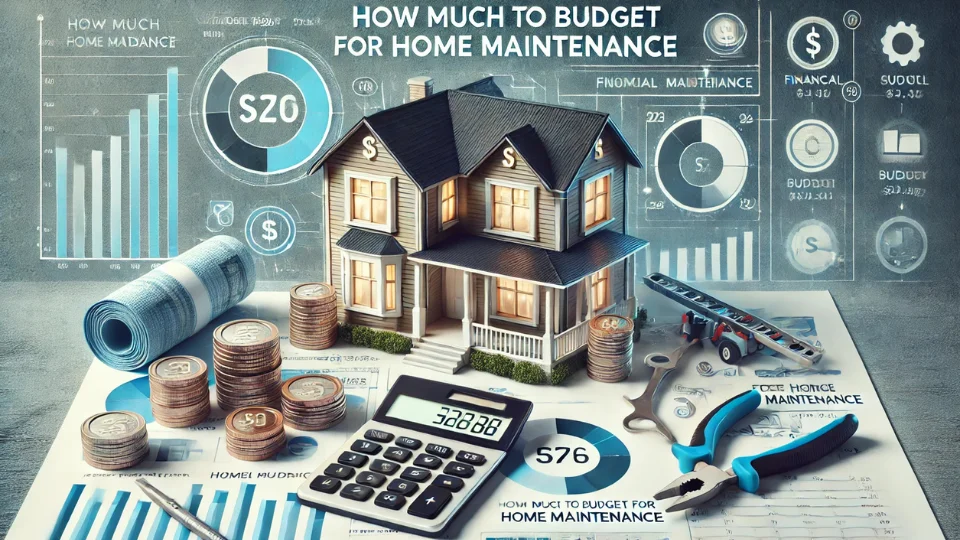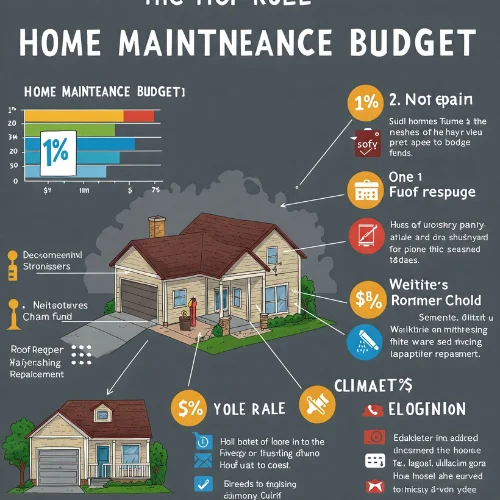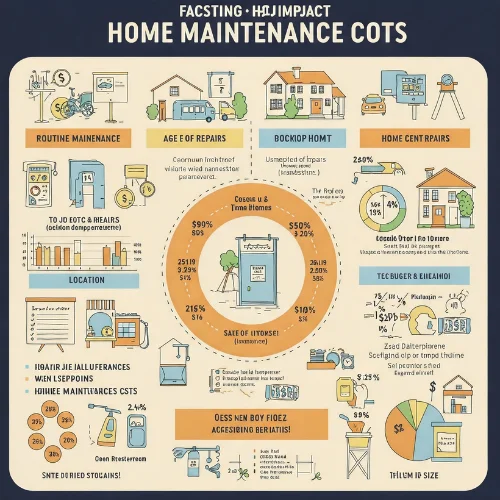How Much Should You Budget for Home Maintenance?

Owning a home comes with ongoing costs beyond the mortgage. One of the most overlooked expenses is home maintenance. Without proper upkeep, small issues can turn into costly repairs. But how much should you budget for it? This guide will help you plan effectively.
The Importance of Home Maintenance Budgeting

Home maintenance ensures your house stays in good condition. Neglecting repairs can lead to expensive fixes. For example, a leaky roof can cause water damage. A minor plumbing issue can turn into a major flood. Regular upkeep keeps your home safe and its value intact.
The 1% Rule: A General Guideline

What Is the 1% Rule?
A common method to estimate home maintenance costs is the 1% rule. This rule suggests setting aside 1% of your home’s value each year for maintenance. For example:
- If your home is worth $300,000, you should budget $3,000 per year.
- If it’s worth $500,000, you should set aside $5,000 per year.
Why It Works
Homes naturally deteriorate over time. The 1% rule provides a simple way to prepare for expected expenses. However, this rule may not fit every home. Let’s explore factors that can affect your budget.
Factors That Impact Home Maintenance Costs

Age of the Home
Older homes usually require more upkeep. Roofs, plumbing, and electrical systems may need repairs more often. A house built 50 years ago will likely cost more to maintain than a brand-new one.
Size and Features
Larger homes cost more to maintain. More square footage means more areas that need care. Features like a swimming pool, large garden, or custom woodwork also increase maintenance expenses.
Location and Climate
Where you live plays a role in costs. Extreme weather conditions, such as heavy snow, hurricanes, or scorching heat, can cause more wear and tear. Homes in humid climates may require frequent mold prevention and pest control.
Quality of Construction
Not all homes are built the same. High-quality materials and skilled labor reduce future maintenance. If your home was built with cheap materials, you may face more frequent repairs.
The Square Footage Rule: Another Approach

How It Works
Some experts suggest budgeting $1 per square foot annually for maintenance. For instance:
- A 2,000-square-foot home would need $2,000 per year.
- A 3,500-square-foot home would need $3,500 per year.
Comparing the 1% Rule and the Square Footage Rule
Both methods provide estimates. However, the 1% rule may be better for high-value homes, while the square footage rule works well for standard houses.
Breaking Down Home Maintenance Costs

Annual and Seasonal Maintenance
Some maintenance tasks happen every year. Others depend on the season.
Spring and Summer
- Cleaning gutters
- Servicing the air conditioner
- Checking for leaks in plumbing
- Repainting exterior walls (if needed)
Fall and Winter
- Cleaning chimneys
- Checking the heating system
- Insulating pipes
- Removing leaves from drains
Unexpected Repairs
Some repairs come out of nowhere. A burst pipe, broken appliance, or electrical issue can happen suddenly. Having a budget prevents stress when emergencies arise.
How to Save on Home Maintenance
DIY When Possible
Many tasks don’t require professional help. Changing air filters, painting walls, or sealing cracks can be done yourself. Watching tutorials online can teach you basic repairs.
Regular Inspections
Catching small problems early saves money. Inspect your home regularly. Look for signs of leaks, cracks, or pests. Addressing them early prevents costly repairs later.
Home Warranty Plans
A home warranty covers certain repairs and replacements. These plans come at a cost, but they may help with large expenses like HVAC or appliance failures.
FAQs
1. What happens if I don’t budget for maintenance?
Neglecting maintenance leads to higher repair costs. Small issues turn into major problems. You may also lower your home’s value.
2. Can I budget less if my home is new?
Yes, newer homes typically require less maintenance. However, after 5-10 years, you should expect increasing costs.
3. Should I save my budgeted amount in a separate account?
Yes, setting up a dedicated savings account for maintenance ensures you have funds ready when needed.
4. What’s the best way to track home maintenance costs?
Use an app, spreadsheet, or notebook to log expenses. Keeping records helps you plan future budgets.
5. Is home maintenance tax-deductible?
Generally, regular home maintenance is not tax-deductible. However, home improvements and repairs for rental properties may qualify.
Conclusion
Home maintenance is a necessary expense. Budgeting properly helps you avoid financial stress and keeps your home in top shape. Whether you follow the 1% rule or the square footage rule, planning ahead ensures you’re prepared. Regular maintenance not only protects your home but also saves you money in the long run. Start budgeting today to keep your home safe and sound.






